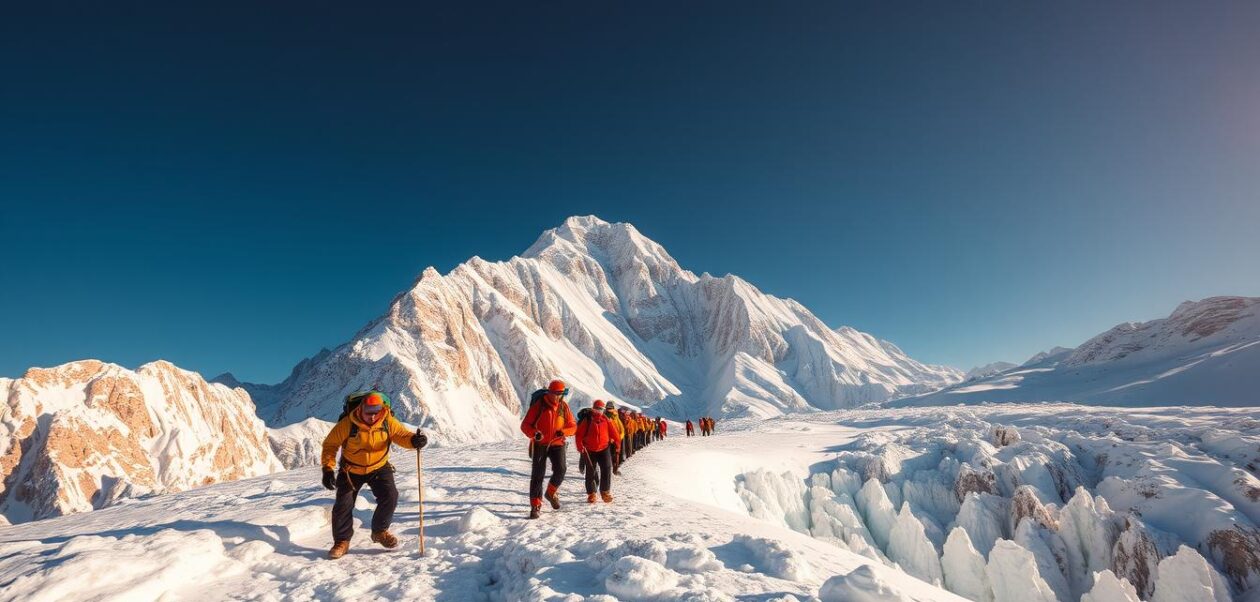You are about to embark on a journey to one of the most treacherous mountains in the world, Mount Everest. The year is 2025, and the story of the “Everest Sleeping Beauty” is one that will test your courage and resilience.
The 2025 expedition to Mount Everest is a tale of loss and bravery. As you delve into the story, you will understand the complexities and challenges faced by the climbers. The narrative is a poignant reminder of the risks involved in conquering the highest peak in the world.
Key Takeaways
- The 2025 expedition to Mount Everest was marked by courage and loss.
- The story of the “Everest Sleeping Beauty” is a testament to the human spirit.
- Climbing Mount Everest is a significant challenge that requires careful planning and execution.
- The risks involved in climbing Mount Everest are substantial.
- The 2025 expedition highlighted the importance of preparedness and teamwork.
The Fateful Expedition of 2025
As you explore the 2025 Everest expedition story, you’ll understand the risks involved in climbing the world’s highest mountain. This expedition was marked by a series of challenges that tested the climbers’ resolve and preparation.
The Climbing Team and Their Preparation
The team was composed of experienced climbers, each with a unique set of skills. Their preparation included rigorous training and meticulous planning.
The Climber Who Became “Sleeping Beauty”
One of the climbers, known for her determination, became the focal point of the tragic events that unfolded. She was an experienced mountaineer with several high-altitude climbs under her belt.
Expedition Goals and Planning
The team’s primary goal was to reach the summit safely. They spent months planning, studying weather patterns, and preparing for potential risks.
Weather Conditions and Initial Challenges
The team faced harsh weather conditions from the outset, including high winds and low temperatures. These conditions tested their equipment and resolve.
| Aspect | Preparation | Initial Challenges |
| Weather | Studied forecasts, prepared for extreme conditions | High winds, low temperatures |
| Climbing Route | Chosen for its relatively safer passage | Ice formations, steep ascents |
| Team Experience | Experienced climbers with high-altitude experience | Altitude sickness, fatigue |

Understanding Mount Everest’s Dangers
As you venture into the world of high-altitude climbing, understanding the dangers of Mount Everest becomes crucial. The mountain’s extreme altitude and harsh weather conditions make it a formidable challenge for even the most experienced climbers.
The Death Zone Above 8,000 Meters
The Death Zone, which begins at an altitude of 8,000 meters, is where the air is too thin to sustain human life for an extended period. Climbers face extreme risks here, including altitude sickness, hypothermia, and exhaustion. The Death Zone is a critical area where climbers must be extremely cautious and prepared.
Modern Climbing Risks in 2025
In 2025, climbers on Mount Everest face modern risks that include advanced equipment limitations and overcrowding issues. Despite advancements in technology, climbing equipment has its limitations, and overcrowding on the mountain can exacerbate risks.
Advanced Equipment Limitations
While modern climbing equipment is sophisticated, it is not foolproof. Equipment failure can occur, and climbers must be prepared for such eventualities. The reliance on technology must be balanced with traditional climbing skills.
Overcrowding Issues
Overcrowding on Mount Everest is a significant issue, leading to delays, increased risk of accidents, and strain on resources. Climbers must navigate through crowded routes, increasing the risk of altitude sickness and other hazards.
| Risk Factor | Description | Mitigation Measure |
| Altitude Sickness | A condition caused by high altitude, leading to headaches, nausea, and fatigue. | Gradual ascent, acclimatization days |
| Weather Conditions | Extreme cold, snowstorms, and high winds. | Weather forecasting, flexible climbing schedules |
| Overcrowding | Congestion on climbing routes, increasing accident risk. | Regulated climbing permits, staggered climbing times |

The Everest Sleeping Beauty Story Unfolds
On the slopes of Mount Everest, a climber’s journey turned into a desperate fight for survival. You are about to witness a gripping narrative that highlights the risks and challenges faced by climbers on the world’s highest mountain.
The Sudden Storm and Communication Breakdown
A sudden storm swept in, catching the climbers off guard. The harsh weather conditions led to a communication breakdown, isolating the team from the rest of the world. The climbers struggled to maintain contact with their base camp, exacerbating the crisis.
- High winds and low visibility made navigation nearly impossible.
- The team’s communication equipment failed, cutting them off from vital support.
Separation from the Group and Survival Efforts
As the storm raged on, the climbers became separated from their group. Survival efforts were initiated, with the isolated climbers relying on their training and experience to stay alive.
Last Known Communications
The last known communication from the climber was a distress call, indicating their dire situation. This call was received by the base camp, who immediately initiated rescue protocols.
Initial Search Attempts
Initial search attempts were hampered by the ongoing storm. Despite the challenges, the rescue team persevered, using survival efforts and expertise to locate the missing climber.

The Everest Sleeping Beauty story is a testament to the human spirit’s capacity for resilience in the face of adversity. As you continue to follow this narrative, the challenges and triumphs of the climbers will become increasingly evident.
Discovery on the South Col
On the harsh terrain of the South Col, a high-altitude search operation unfolded in 2025. The South Col, a saddle-shaped ridge between Mount Everest and Lhotse, is notorious for its extreme altitude and harsh weather conditions. It was here that the climbers launched a daring search to locate the Everest Sleeping Beauty.
The High-Altitude Search Operation
The search operation on the South Col was a complex endeavor, involving both cutting-edge technology and human endurance. Climbers had to navigate through treacherous terrain, battling against the thin air and freezing temperatures.
Drone Technology in 2025 Rescue Efforts
The use of drone technology marked a significant advancement in the 2025 rescue efforts. Drones equipped with high-resolution cameras and sensors were deployed to scour the South Col, providing real-time data to the rescue team. This technology proved invaluable in locating the climber amidst the vast, snow-covered expanse.
Ground Team Challenges
Despite the technological advancements, the ground team faced formidable challenges. The extreme altitude and harsh weather conditions made every step a test of human endurance. The team had to be meticulously prepared and equipped to survive the environment while searching for the missing climber.
Finding the “Sleeping Beauty” in the Snow
After days of searching, the team finally located the Everest Sleeping Beauty on the South Col. The discovery was a mix of relief and concern, as the climber was found in a critical condition. The rescue team quickly sprang into action, providing medical aid and preparing for the challenging task of evacuation.
The Rescue Attempt
The rescue attempt on Mount Everest is a testament to human courage in the face of extreme adversity. As you delve into the details of this daring operation, you’ll understand the medical complexities and the bravery involved.
Medical Challenges at Extreme Altitude
Rescuing “Sleeping Beauty” required navigating through treacherous terrain while combating the harsh effects of high altitude. At elevations above 8,000 meters, the air is thin, and oxygen levels are critically low.
Hypothermia and Oxygen Deprivation
Hypothermia and oxygen deprivation are two critical conditions that the rescue team had to address. Hypothermia occurs when the body loses heat faster than it can produce it, causing dangerously low body temperatures. Oxygen deprivation, or hypoxia, impairs cognitive function and physical performance.
Emergency Medical Procedures
The rescue team employed specialized medical procedures to stabilize “Sleeping Beauty.” These included administering oxygen, using portable heaters to combat hypothermia, and carefully monitoring vital signs.
The Heroic Team Effort Against Impossible Odds
The rescue team’s efforts were nothing short of heroic. Despite the extreme conditions, they worked tirelessly to save “Sleeping Beauty.” Their actions were a testament to the human spirit’s capacity for courage and compassion.

| Medical Challenge | Description | Rescue Measure |
| Hypothermia | Dangerously low body temperature | Portable heaters, warm blankets |
| Oxygen Deprivation | Low oxygen levels impairing cognitive and physical function | Oxygen supply, careful monitoring |
| High-Altitude Sickness | Condition caused by high elevation | Descent, rest, hydration |
Aftermath and Global Response
The 2025 ‘Sleeping Beauty’ incident on Mount Everest had a profound impact on the climbing community and the general public alike. As the news spread, it triggered a global response, with many calling for a review of current climbing practices and safety measures.
Media Coverage and Public Reaction
The media coverage of the incident was extensive, with major news outlets around the world reporting on the tragedy. The public reaction was one of shock and concern, with many expressing their condolences to the families of those affected. The incident sparked a wide-ranging debate about the risks involved in high-altitude climbing and the measures that can be taken to mitigate these risks.
Impact on Everest Climbing Regulations
The incident led to a significant review of Everest climbing regulations. Climbing authorities and governments began to assess whether current regulations were sufficient to ensure climber safety.
New Safety Protocols Implemented
New safety protocols were implemented, including more stringent health checks for climbers and enhanced monitoring of weather conditions. These changes aimed to reduce the risks associated with climbing Everest.
Ethical Debates Reignited
The incident also reignited ethical debates about the commercialization of Everest climbs and the responsibilities of guide services towards their clients. These discussions highlighted the need for a balanced approach between making Everest accessible to climbers and ensuring their safety.
Lessons from the 2025 Tragedy
The tragedy that unfolded on Everest in 2025 offers valuable lessons for the climbing community and beyond. As you reflect on this incident, it’s crucial to understand the factors that contributed to the tragedy and how they can be mitigated in the future.
Comparing to Historical Everest Disasters
Mount Everest has a history of tragic incidents, and the 2025 event is a stark reminder of the mountain’s dangers. By comparing this incident to historical disasters, you can gain a deeper understanding of the risks involved. For instance, the 1996 disaster, which claimed several lives, highlighted the importance of guided tours and weather forecasting.
The Human Cost of Extreme Adventure
The human cost of extreme adventures like climbing Everest is often overlooked until tragedy strikes. You must consider the physical and emotional toll on climbers and their families. The 2025 tragedy brought to light the need for better support systems for climbers and their loved ones.
Psychological Impact on Survivors
Survivors of such tragedies often suffer from long-term psychological effects, including PTSD. It’s essential to provide them with adequate psychological support and counseling.
Memorial Efforts and Legacy
In the aftermath of the tragedy, memorial efforts were made to honor those who lost their lives. You can learn from these efforts and how they contribute to the legacy of the climbers. The memorials serve as a reminder of the risks and sacrifices made by those who attempt to conquer Everest.
Conclusion: Remembering Courage in the Face of Nature’s Power
You’ve witnessed the harrowing tale of the “Everest Sleeping Beauty” story, a testament to the courage and resilience of climbers in the face of nature’s overwhelming power. The 2025 expedition to Mount Everest was marked by unforeseen challenges and tragic losses, leaving an indelible mark on the climbing community.
As you reflect on this story, you’re reminded that courage is not the absence of fear, but the judgment that something else is more important. For those who dare to climb Everest, the pursuit of adventure and the thrill of standing atop the world’s highest peak often come at a great personal cost.
The “Everest Sleeping Beauty” story serves as a poignant reminder of the risks involved in extreme adventure and the importance of respecting nature’s power. As you look back on this tale of courage and loss, you’re encouraged to appreciate the bravery and determination that define the human spirit.

FAQ
What is the “Everest Sleeping Beauty” story?
The “Everest Sleeping Beauty” story refers to a climber who became incapacitated on Mount Everest during the 2025 expedition and was later discovered on the South Col.
What were the main challenges faced by the climbers during the 2025 Everest expedition?
The climbers faced numerous challenges, including extreme weather conditions, overcrowding on the mountain, and equipment limitations.
How did the 2025 expedition team prepare for their climb?
The team underwent extensive preparation, including training, equipment checks, and planning for potential risks and emergencies.
What role did drone technology play in the rescue efforts?
Drone technology was used to aid in the high-altitude search operation, helping to locate the “Sleeping Beauty” on the South Col.
What were the medical challenges faced during the rescue attempt?
The rescue team encountered medical challenges, including hypothermia and oxygen deprivation, which complicated the rescue efforts.
How did the “Everest Sleeping Beauty” incident impact climbing regulations on Everest?
The incident led to a review of climbing regulations, resulting in the implementation of new safety protocols to mitigate future risks.
What was the public’s reaction to the “Everest Sleeping Beauty” story?
The story garnered significant media attention, sparking public debate and discussion about the risks and ethics of high-altitude climbing.
What lessons can be learned from the 2025 Everest tragedy?
The incident highlights the importance of understanding the risks associated with extreme adventure, the need for robust safety protocols, and the psychological impact on survivors.
How has the climbing community responded to the “Everest Sleeping Beauty” incident?
The climbing community has reflected on the incident, comparing it to historical Everest disasters and re-examining the human cost of extreme adventure.
One climb. One choice. One legend. Dive into the haunting fate of Everest Sleeping Beauty.




